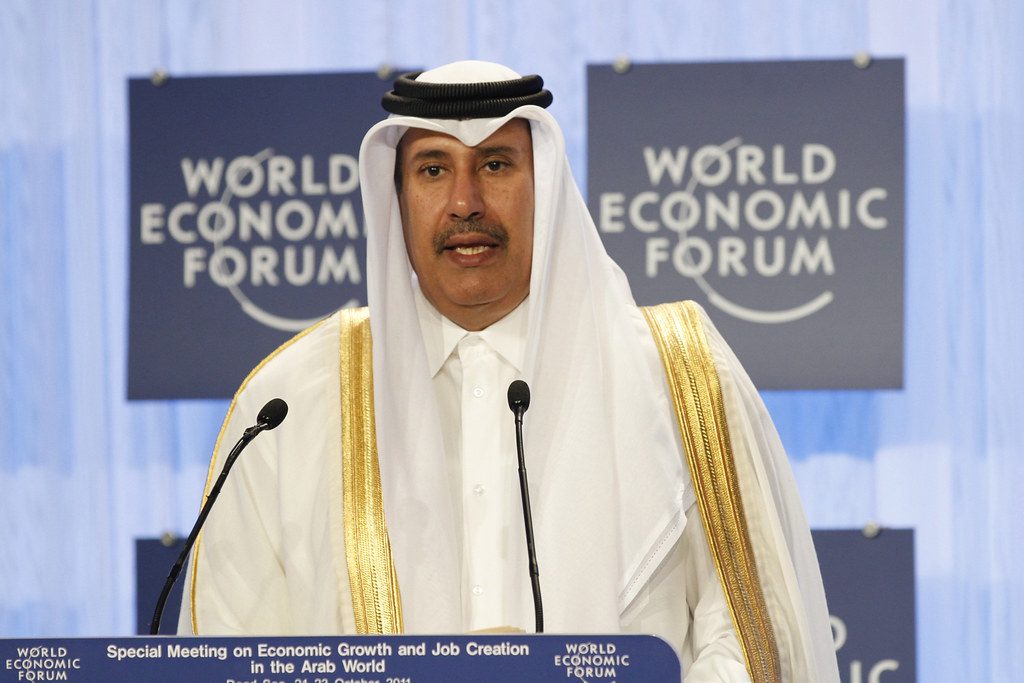The official said Qatar, which has served as a heavyweight mediator among conflicting parties in recent years, should take the reins to push for dialogue.
Qatar’s former Prime Minister Sheikh Hamad bin Jassim bin Jaber Al Thani spotlighted the urgency in findings means of solution, such as negotiations, to identified regional threats, saying no government wants to go to war with Iran.
“If we have challenges and if we agree Iran is our first enemy; how we can deal with this matter? Are we going to deal with it through direct negotiation? Through war, which nobody wants war because that’s not in our benefit,” the official, also known as HBJ, said in an exclusive interview with Bloomberg on Wednesday.
“The first fear for me is not Iran. The first fear is us in the region. The way how we behave,” the Qatari official said.
Referring to the types of behaviour that should be adopted when dealing with challenges, the former prime minister said such manners are up to the “the leader,” adding “I’m not one of them.”
However, he said outlining a political stance would make a civilised outcome more inevitable. “I think if we can control our happiness and our frustration and when we are angry. To put it as a statement in a box and say, okay, we have some difference with ‘X’ country or that, but this different have to be discussed in a civilised way.”
The official said Qatar, which has served as a heavyweight mediator among conflicting parties in recent years, should take the reins and say “‘okay, we have a problem with Iran. We sit with them and discuss the details, frankly, and reach a solution,’ because I believe we should live in the Gulf area in harmony between Iran, Iraq and the GCC countries.”
Such an outcome would be beneficial on various fronts, he claimed. “If we can do that, I think this is a big achievement, not only for the peace, for the trade, for the business, for the economy of that,” he noted.
Palestine
HBJ also touch on the topic of Palestine during the same interview, in which he said solid leadership from within Occupied Palestine is needed to cement a peaceful coexistence, dismissing foreign interference unless for mediations efforts.
“Leadership in both sides would like to take a step. It’s not a leadership in America to push them.” He further noted that the United States could be a potential facilitator, though he added it is crucial to involve Arab countries too.
For the Palestinian file, two leaderships are needed, he argued, adding that “they are not there at the moment. From the Palestinian side and from the Israeli side.”
“We need another Rabin [referring to former Israeli prime minister, Yitzhak Rabin]. from the from the Israeli side.”
“From the Palestinian side, Abu Mazen [Mahmoud Abbas], now he did what he did in Oslo and things. I don’t want to evaluate the guy, you know, his a friend and I know him. But I think we need to see new leadership which have commitment from the Palestinian side,” he suggested.
The official went on to dub the Abraham Accords as a “childish” approach to the providing a resolution to the conflict at hand.
“I don’t believe to solve the problem, to do Abraham things. Or I think this is. And it kind of, I’m sorry to say this [but] I think this is childish.”
HBJ further expressed his concern saying that if a plan is not put in place, “I’m worried that within 10 years. If there is nothing happened within maybe [even] before that we find ourselves in another Intifada in the Palestinian side and we will find the Arabs here, in the streets saying ‘what you are doing as a government?'”
As for the official stance of Qatar, the Gulf nation has long maintained a staunch standing against normalisation with the Zionist regime in the “absence of a real commitment to a two-state solution”.
Qatar’s Foreign Minister Sheikh Mohammed Mohammed bin Abdulrahman Al Thani told the Axios February last year that his country had previously maintained ties with Tel Aviv “when there were prospects for peace” with the Palestinians, but it “lost hope” following the Israeli onslaught on Gaza in 2008.
Dubbed “Operation Cast Lead”, the illegal occupation killed up to 1,436 Palestinians including 410 children during the brutal military offensive on the besieged Gaza Strip, which lasted for three weeks.
The top Qatari diplomat clarified Doha’s engagement with Israel is to provide much-needed assistance to Palestinians and that it will not be signing the Abraham Accords “in the absence of a real commitment to a two-state solution”.
A wave of normalisation was seen in the region in 2020, when the United Arab Emirates and Bahrain signed the Abraham Accords, under which they normalised ties with the Zionist state. Sudan shortly followed suit in 2021.
Doha has long expressed its commitment to the Arab Peace Initiative, which was adopted in 2002 by the Gulf Cooperation Council (GCC), stating that member countries shall refrain from normalising with Israel until it fully withdraws from lands occupied in 1967.







